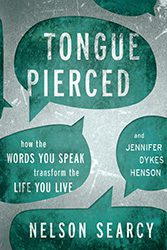 Nelson Searcy and Jennifer Dykes Henson’s Tongue Pierced: How the Words You Speak Transform the Life You Live is an accessible and timely book. The rise of social media has made it possible for our words to be broadcast much further and with greater ease than ever before. The ability to speak “anonymously” from behind a computer screen and the ease with which we can drop in and out of online conversations create additional challenges when attempting to be accountable and responsible with our words. We live in a culture where everyone is expected to have something to say. One of my students recently shared with me, for example, that she “thinks in tweets.” In other words, her experience of life involves the anticipation of later articulating her experiences for the public. I think many of us can relate.
Nelson Searcy and Jennifer Dykes Henson’s Tongue Pierced: How the Words You Speak Transform the Life You Live is an accessible and timely book. The rise of social media has made it possible for our words to be broadcast much further and with greater ease than ever before. The ability to speak “anonymously” from behind a computer screen and the ease with which we can drop in and out of online conversations create additional challenges when attempting to be accountable and responsible with our words. We live in a culture where everyone is expected to have something to say. One of my students recently shared with me, for example, that she “thinks in tweets.” In other words, her experience of life involves the anticipation of later articulating her experiences for the public. I think many of us can relate.
The capability for instantaneous and near-incessant communication at our fingertips has the potential to be really incredible and wonderful. But it also should prompt us to take the time to think about the nature and quality of our communication. Searcy and Henson—though not focused on digital communication specifically—provide an applicable, detailed, and thoroughly biblically grounded approach for doing so.
As a starting point, Bible has a LOT to say about our words. The sheer number of verses that Searcy and Henson catalogue (over 400) is testimony to the importance of their subject matter for Christians and leads them to their central premise, which is that we should be living “tongue pierced” lives.
Searcy and Henson examine what such a “tongue pierced” life might look like from a variety of different angles, including:
- The relationship between the quality of our life and the quality of our words
- The status of words as a reflection of our hearts
- The creative power of words
They also provide concrete and biblical strategies for how to begin to take hold of our words, noting significantly that, in our own strength, we will never be able to control our speech. The only way, in fact, that our words can ever be right is if our heart is right with God:
“[Y]ou will never be successful using your words to positively impact your own life and the lives of others simply by trying to edit what comes out of your mouth. You have to get to the root of your word problems—the condition of your heart. Superficial techniques and quick fixes will only get you so far. To really change your life by changing your words, it’s essential to examine the source of your speech habits.”
With that truth in mind, Searcy and Heson advise readers on how to pursue godly uses of our words—praise, encouragement, and prayer—and how to avoid sinful uses of our words—gossip, complaining, and cursing. They discuss in particular the role words play in two of our most important earthly relationships: the husband-wife relationship and the parent-child relationship.
Searcy and Henson are convinced that we will reap in our lives what we sow with our words and that we will, in particular, see consequences in the areas of our personal accomplishments, relationships, and health. If this assertion sounds a bit “Prosperity Gospel” to you, stick with them; their scriptural support does a decent job of holding up to the claim. For example, when they write that our personal accomplishments can be impacted by our words, one example they give is that “When you think negatively about yourself, you are putting down God. You are his child, created in his image.” What they are pointing to is that we need to believe about ourselves what God believes about us, not primarily to improve our lives, but because what God says about us is truth and anything other than that is falsehood.
The greatest value that Tongue Pierced holds is, as is the case with all extra-biblical texts, that it points us back to Scripture. Searcy and Henson assert over and over again the commands to “Take captive every thought to make it obedient to Christ” (2 Corinthians 10:5) and to “fix [our] thoughts on what is true, and honorable, and right, and pure, and lovely, and admirable” (Philippians 4:18) as the source for ensuring that our speech be “right.” Tongue Pierced challenged me to consider more carefully the source, impact, and character of my words and to hold them to a higher standard, and though any Christian could, I would imagine, benefit from the reminders this text holds, I think it might prove especially effective in the context of a study group for millennials.
Read an excerpt — and more — from Tongue Pierced here.
 Amber M. Stamper holds a Ph.D. in English (Rhetoric and Composition) and is an Assistant Professor of Language, Literature, and Communication at Elizabeth City State University in North Carolina. Her research and publications center on religious rhetoric and communication, especially issues of Christian evangelism and the digital church.
Amber M. Stamper holds a Ph.D. in English (Rhetoric and Composition) and is an Assistant Professor of Language, Literature, and Communication at Elizabeth City State University in North Carolina. Her research and publications center on religious rhetoric and communication, especially issues of Christian evangelism and the digital church.













